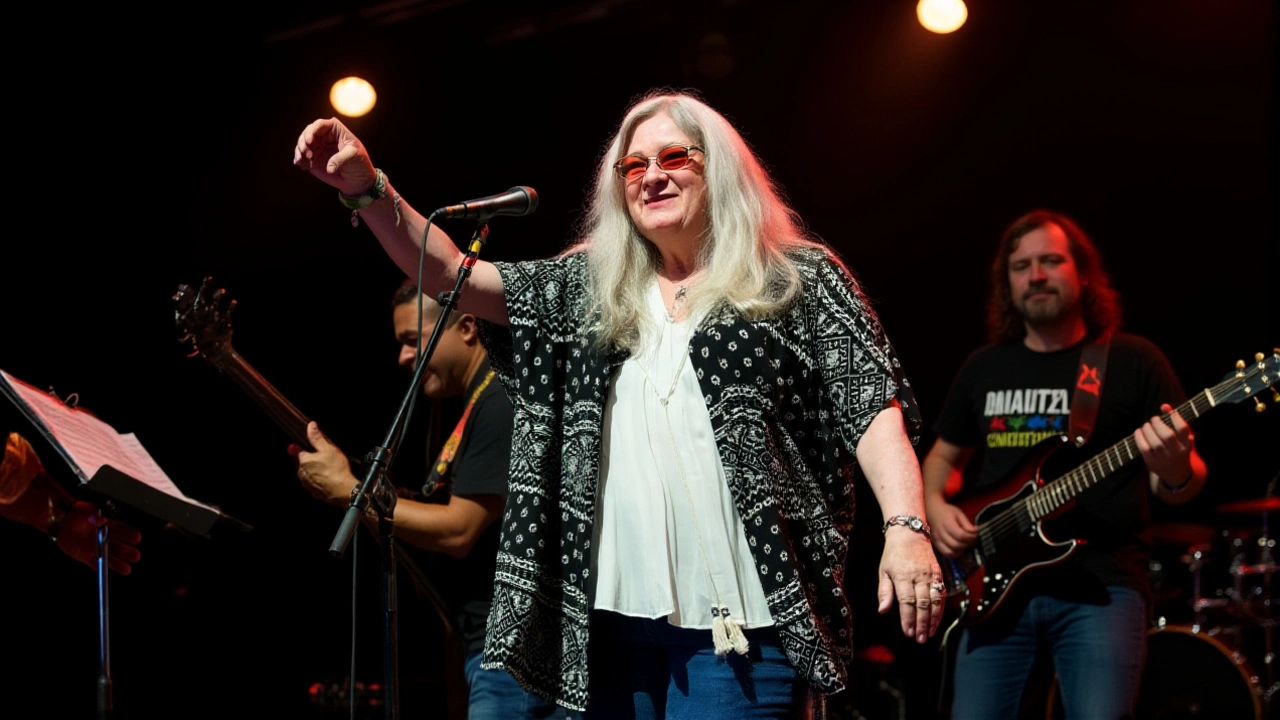Donna Jean Godchaux-MacKay, the soulful voice that helped define the Grateful Dead’s golden era, died on November 2, 2025, at age 78. Her passing marks the end of an era for the band’s devoted fanbase, the Deadheads, who remember her harmonies as the emotional backbone of classics like "Truckin'" and "Ripple." The singer, born Donna Jean Thatcher in Florence, Alabama, left behind a legacy that stretched from Muscle Shoals studios to the stages of Fillmore West — and into the hearts of millions who found solace in the Dead’s improvisational jams.
From Muscle Shoals to the Fillmore
Before she became a household name among Deadheads, Godchaux-MacKay was one of the unsung heroes of Southern soul. Between 1965 and 1970, she lent her mezzo-soprano to some of the most iconic records of the decade: Percy Sledge’s "When a Man Loves a Woman," Elvis Presley’s "Suspicious Minds," and tracks by Boz Scaggs, Cher, and Neil Diamond. All of it recorded in the hushed, reverberant rooms of FAME Studios in Muscle Shoals, Alabama — a place where raw emotion met studio magic.
Her move to California in the early 1970s changed everything. She married keyboardist Keith Godchaux in 1970, and in September 1971, she introduced him to Jerry Garcia after a show at San Francisco’s Keystone Korner. That night didn’t just change Keith’s life — it altered the sound of the Grateful Dead forever.
The Voice That Held the Band Together
Godchaux-MacKay joined the Grateful Dead in early 1972, replacing the late Ron "Pigpen" McKernan as the band’s primary female vocalist. Her voice wasn’t just an addition — it was a counterpoint to Garcia’s weary tenor, a grounding force in the band’s increasingly psychedelic explorations. On Wake of the Flood (1973), her lead on "Here Comes Sunshine" felt like sunlight breaking through redwood canopies. On Blues for Allah (1975), her harmonies on "Crazy Fingers" gave the song its haunting, spiritual lift.
She didn’t just sing backup. She often carried the melody. Fans still debate whether "China Doll" or "The Music Never Stopped" would have had the same emotional weight without her. And then there was Shakedown Street (1978), her final studio album with the band — a record that captured both the band’s peak and the quiet unraveling of its inner circle. Keith Godchaux’s growing struggles with addiction, and the toll it took on their marriage, cast a shadow over those final years.
After the Band: A Quiet, Persistent Legacy
She left the Grateful Dead in February 1979, not with a bang, but with a sigh. Keith died in a car crash just over a year later, in July 1980, at age 32. Donna Jean didn’t disappear. She raised their two children, kept playing, and quietly kept the music alive.
In 2006, she formed the Donna Jean Godchaux Band in Santa Cruz, California — a project that wasn’t nostalgia, but renewal. She reimagined Dead classics with jazz-inflected arrangements, often featuring guitarist Zak Trojano and bassist Mike Flynn. Her 2023 performance at the Sweetwater Music Hall in Mill Valley, California, was her last — a two-hour set that ended with "Brokedown Palace," her voice still clear, still tender, still carrying the weight of decades.
The Ripple Effect
Her death isn’t just a loss for fans — it’s a reminder of how deeply the Grateful Dead’s music was shaped by collaboration. Garcia, Lesh, Weir, Kreutzmann — they were the pillars. But Godchaux-MacKay? She was the glue. The warmth. The human heart inside the machine.
Today, tribute bands like Dead & Company keep the music alive on stages from Chicago to Tokyo. The Gathering of the Vibes festival still draws tens of thousands. But for many, her voice was the one that made the Dead feel like family. When she sang "I know you, I’ve seen you, I’ve known you since you were a child," it wasn’t just lyrics — it was a promise.
What Comes Next?
As of November 4, 2025, neither Grateful Dead Productions nor the official band website has issued a statement. No memorial dates have been announced. But that doesn’t mean they won’t come.
Expect impromptu gatherings at Grateful Dead landmarks — the corner of 12th and Valencia in San Francisco, where Garcia once played for spare change; the parking lot of the Fillmore, where she first sang with the band; the quiet benches of St. Helena, where Keith’s memory still lingers. Fans will light candles, pass around bootlegs, and sing "Till the Morning Comes" — her favorite encore.
Her final album, Donna Jean: Live at the Church, recorded in 2021, is set for posthumous release in early 2026. The liner notes, written by Phil Lesh, simply say: "She didn’t just sing with us. She sang for us. And we never stopped listening."
Frequently Asked Questions
What was Donna Jean Godchaux-MacKay’s role in the Grateful Dead?
Donna Jean Godchaux-MacKay served as a lead and backing vocalist for the Grateful Dead from 1972 to 1979. Her rich mezzo-soprano voice added emotional depth to songs like "Ripple," "Truckin'" and "China Doll," helping define the band’s sound during its most creatively fertile period. She was the only female vocalist to hold a permanent role in the band’s classic lineup.
Did she write any songs for the Grateful Dead?
While she didn’t write songs credited to the Grateful Dead, she co-wrote much of the material on the 1975 album Keith & Donna with her husband, Keith Godchaux, and Jerry Garcia. Songs like "Sailin’" and "Ain’t No Use" reflect her songwriting voice, blending gospel, folk, and rock influences that later shaped the band’s softer, more introspective material.
How did she influence later generations of musicians?
Her vocal style — warm, nuanced, and deeply expressive — influenced artists like Natalie Merchant, Emmylou Harris, and even modern jam-band vocalists like Grace Potter. Her ability to blend seamlessly with male leads while still asserting emotional authority became a blueprint for female vocalists in improvisational rock, proving harmony could be both powerful and personal.
What’s the significance of her Muscle Shoals work?
Her session work in Muscle Shoals placed her at the center of American soul music’s golden age. Singing on Percy Sledge’s "When a Man Loves a Woman" and Elvis Presley’s "Suspicious Minds" meant she helped shape two of the most emotionally resonant pop songs of the 20th century — before most people even knew her name. That experience gave her an intuitive grasp of phrasing and dynamics that later defined her Grateful Dead performances.
Will there be a public memorial for her?
No official memorial has been announced as of November 4, 2025. However, fans are already organizing spontaneous tributes at Grateful Dead venues across the U.S., including the Capitol Theatre in Port Chester, New York, and the Warfield in San Francisco. Her Donna Jean Godchaux Band may also hold a tribute concert in early 2026, potentially featuring members of Dead & Company.
What’s her legacy in the broader context of rock history?
Donna Jean Godchaux-MacKay represents a rare bridge between Southern soul, psychedelic rock, and the communal spirit of the 1970s jam band scene. She was one of the few women in rock at the time who wasn’t just a backing voice — she was a co-architect of sound. Her legacy isn’t just in recordings, but in the way she made fans feel seen, heard, and held — something the Grateful Dead always promised, and she made real.




